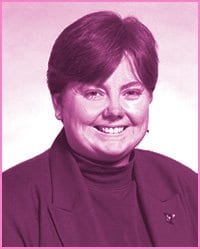Donna Morgan’s road to being political aware finds its roots in the provincial labour strife of the early 1980s, a conflict which resulted in the general strike of 1983.
It was that experience that led the former COPE parks commissioner into student politics at the University of Victoria and Simon Fraser University where she studied biology.
It wasn’t long before she became engaged with municipal politics, eventually running for parks board. She met people such as former city councillor and now queer Vancouver East MP Libby Davies.
“She’s a big hero of mine,” Morgan says of Davies. “And Sue Harris-she was the first openly lesbian politician in the city. I really like the way they both approached politics so I became involved.”
That involvement with COPE now spans two decades.
But, while she remains as COPE’s internal co-chair, Morgan has opted out of active politics in recent years to spend time with her young daughter.
“It’s kind of hard to find a meeting that’s more important than hanging out with her,” Morgan says.
But Morgan has remained engaged, most notably as one of COPE’s organizers of the Yes campaign for the Oct 16 referendum on wards.
“The idea is to look at improving democracy in Vancouver,” Morgan says.
“In over 60 years, there hasn’t been anything that’s gone toward improving democracy or moving us towards a better system of civic government. I see this as a necessary first step.”
Morgan, a teacher, says COPE and the NPA now have a stranglehold on the city’s government. She wants that changed so Vancouverites are more connected to the political process.
“People aren’t involved in electing their individual councillors because it’s such a mass system” with voters facing huge and intimidating lists of candidates for council when they enter the voting booth. “It’s basically just selecting a party. People just can’t make a good choice in those circumstances.”
A resident of Grandview-Woodlands neighbourhood, Morgan says individual voters have more power with wards. It makes politicians more accountable, she says.
“Having somebody represent you by neighbourhood makes sense. You know who’s responsible,” she says.
Vancouver had a ward system until 1929, with the city divided into 12 wards. In an effort to create a more unified city, the council of the day decided to dispense with the system.
Council based its decision to hold October’s referendum on a report by retired BC Supreme Court Justice Thomas Berger.
Berger said a ward system would open up the political process to independents. He suggested dividing the city into 14 wards for the election of councillors. The mayor, school trustees and parks board commissioners would still be elected using the at-large system.
But, says Morgan, that could change. While there would be 14 council wards, she suggests only seven parks commissioners with candidates running in an area that covers two wards.
And, she adds, proportional representation could be considered in the future to ensure minority viewpoints are heard in council.
“The Indo-Canadian community is interested in wards because they have such a strong geographic location,” Morgan points out. “The same might be said for the gay and lesbian community.”
But, she’s quick to add, the ward system is not perfect. Morgan says the strength of the at-large system is that Vancouverites can contact any councillor. Still, when councillors get their votes from across the city, it’s hard for a neighbourhood to exert any real pressure on council. The result, says Morgan, is that an at-large system makes neighbourhood issues subordinate to citywide issues.
Morgan sees poverty being a key issues for the future. As the city grows, keeping it liveable is key, she says. Dealing with poverty is a major part of that, she maintains. And, she adds, the downloading of costs due to provincial Liberal government cuts has exacerbated that problem.
A parks commissioner from 1993 to 1996, Morgan became involved in stopping the Stanley Park aquarium from keeping whales and dolphins in captivity. She hopes the awareness people have on that issue will grow to include any keeping of mammals in captivity at the aquarium.
“People’s consciousness is changing,” she says.
Does Morgan see herself getting back into politics as a candidate?
“I have a six-year-old,” she says. “Maybe when she’s a bit older. Right now, I’m really enjoying being around her.”
INFOBOX:
Would wards be good for gays?
A public debate.
Tue, Oct 5. 7-9:30 pm.
Roundhouse Community Centre.
181 Roundhouse Mews at Davie St.
Sponsored by: the Gay & Lesbian Business Association & Xtra West.

 Why you can trust Xtra
Why you can trust Xtra


